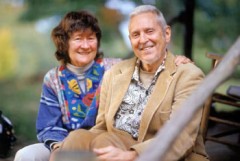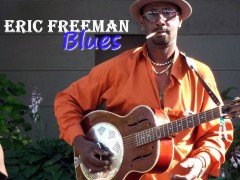Recordially, Lou Curtiss
Guy Carawan

Guy & Candie Carawan, 2003. Photo by Jack Parker.
It was Spring 1960 at the Newport Folk Festival in Rhode Island that I first met Guy Carawan. It was a rainy day and there were only 15 or 20 of us that braved the wet to listen to Guy, who us lefties were kind of impressed with because he had visited China with Peggy Seeger a few years prior when traveling to such places wasn’t allowed. Guy sang a song that he had adapted from an old hymn and put some new words to, which were being sung by young people in the South working for equal rights. It was called “We Shall Overcome” and it became the anthem of the Civil Rights Movement.
Guy was from California but had drifted east sometime in the 1950s to the New York folk scene. He cut two or three LPs for the Folkways People, toured around the South with Ramblin’ Jack Elliott and Frank Hutchison (an event celebrated in Ramblin’ Jacks song “912 Greens”), got connected with the Highlander Folk School in Tennessee, and off and on made his home there for the rest of his life except when he travelled out West to spend time in San Diego every summer for many years. He also did some work in the South Carolina Sea Islands and I remember seeing him at the UCLA Folk Festival with a troupe from John’s Island South Carolina called the Moving Star Hall Singers. He wrote a book about the Sea Islands called “Ain’t You Got a Right to the Tree of Life.” I also saw him here in San Diego in 1962 at the Sign of the Sun Bookstore and Folk Music Center, playing on a bill with Jean Ritchie and then later with Georgia Sea Island Singer Bessie Jones. There was a little bookstore up in La Jolla where he’d regularly play on his summer visits and I seem to remember him at the Heritage Coffeehouse as well.
At least once during my time in McComb Mississippi with the Student Non-Violent Coordinating Committee teaching in the Freedom School I ran into Guy with Bernice Reagon and the Freedom Singers who set up a sound system in a cornfield and did a concert for us and the local townspeople. It was kind of a scary time because just across that cornfield about a half a mile away was the mansion of the Grand Wizard of the Mississippi Ku Klux Klan. Nothing happened though and some good music was shared.
When I started doing the San Diego State Folk Festivals in 1967 Guy was one of those people I wanted to have. He first played for me at the second festival and from then on played every two or three years. He usually brought out a traditional old time performer with him (usually one with a radical bent like coal miner/ songster George Tucker). By this time Guy had made his home at the Highlander Folk School and it was during the early ‘70s that he published his fine book Voices from the Mountains. Guy, along with his wife Candie, continued to spend time in San Diego. I had them play at a Folk Arts Rare Records concert in 1973 and again at a series of concerts I put together at the Normal Heights United Methodist Church in the 1980s. Finally he and Candie played at one of the last Adams Ave. Roots Festivals in about 2007.
When I first met Guy he was playing mostly 12-string guitar and banjo. He later added hammered dulcimer to the mix. He recorded for several labels including Prestige, June Appal, and his own label (I forget what he called it). Although a fine performer himself, I think Guy always got more of a kick introducing folks to new and interesting kinds of traditional music. He certainly did that. The world lost a small piece of musical history last month with Guy’s passing and San Diego lost a regularly visiting musician who always brought something new and interesting each summer. RIP old friend.

Eric Freeman
Eric Freeman
I got the opportunity a couple of Fridays ago to hear Eric Freeman play his blues live at Folk Arts Rare Records (Brendan Boyle’s new version of Folk Arts, located on El Cajon Blvd.) and it was a real treat. Eric hails from Virginia and grew up in the same area as the great John Jackson, picking up a repertoire that well represents that East Coast blues style with hints of Blind Boy Fuller, Blind Blake, Brownie McGhee, Gary Davis, and others. It’s kind of a full circle for the blues and Folk Arts Rare Records. In the early years of Folk Arts (circa 1968) I was blessed with blues artists like Thomas Shaw, Robert Jeffery, Sam Chatmon, and Tom “Tomcat” Courtney becoming part of the Folk Arts family, now in the shop’s new incarnation; it’s again a young vital country bluesman like Eric Freeman making his name around the store. Eric is currently playing around San Diego these days and deserves to be heard a lot more. Club owners take note: Hire this guy!!! You won’t be sorry and if you don’t you have a hole in your soul.
Recordially,
Lou Curtiss










